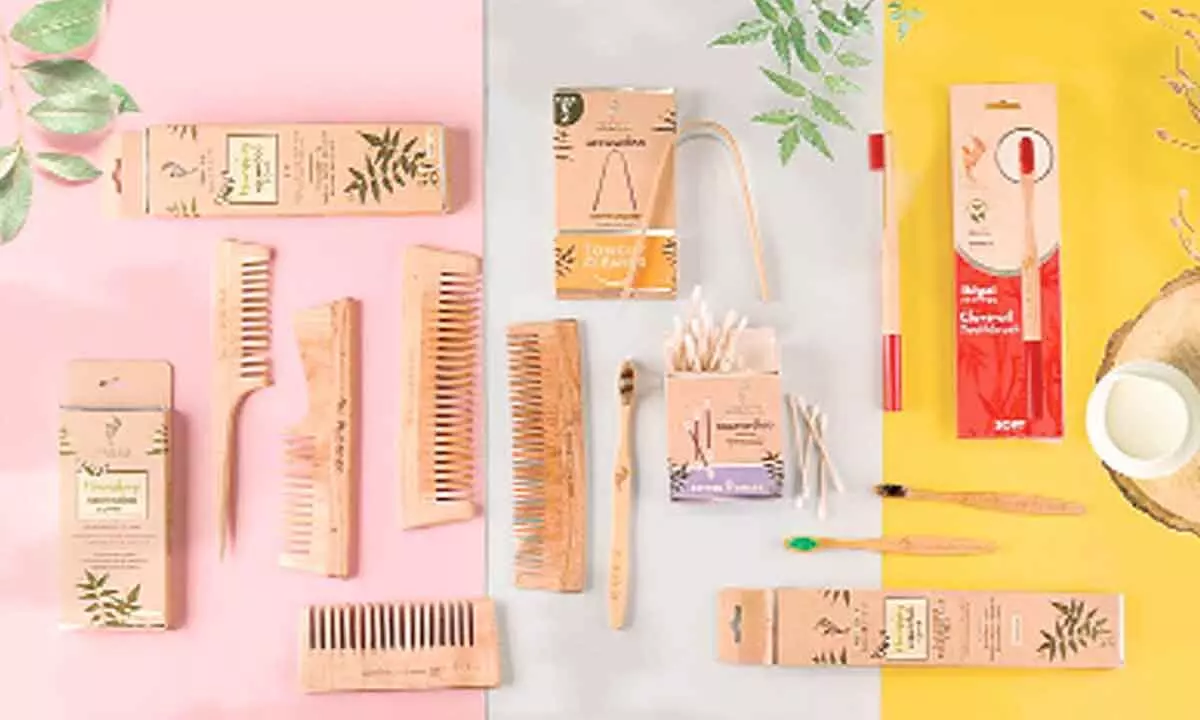Live
- 38 more Myanmarese immigrants deported to Myanmar from Manipur
- IPL 2024: Fifties from Nitish Reddy and Travis Head carry SRH to huge 201/3 against RR
- Repolling at one booth in Ajmer records 68.66 pc turnout
- J&K Police attach property of terror handler operating from Pak
- LS polls: MVA, VBA candidates in Maharashtra file nomination amid muscle-flexing
- TUC 2024: India’s campaign ends as both men's and women's teams go down in quarters
- NewsClick, others went to great lengths to paint CAA as discriminatory law targeting Muslims: Delhi Police charge sheet
- Illegal mining in Rajasthan: 4 FIRs lodged, 27 vehicles impounded
- Schools bomb threat: 125 calls received at police emergency number, says FIR
- In Gujarat, PM Modi's no-holds-barred attack on Cong, INDIA bloc over Pak's love for 'Shehzada' & 'vote jihad'
Just In
India banning single use plastic: Bamboo becomes the best alternative


Nations across the globe are now adapting to bamboo products as a viable alternate to plastic. Fast-growing and adaptable, bamboo provides a source of both disposable and lasting goods that are low-carbon to create and may be biodegradable, which can help to minimise plastic pollution
International pressure to stop using plastic is growing and countries are acquiring strict measures to eliminate the use of plastic. More nations, including India have recently imposed limitations on the manufacturing and use of plastic as a result of the negative impact plastic has on the environment, including damage to human and marine health, pollution of beaches and landscapes, and blockage of waste streams and landfills. Around 130 nations have already imposed some sort of plastic ban or limitation, while other nations have outlined bold plans for more circular, sustainable economic growth.
Nations across the globe are now adapting to bamboo products as a viable alternate to plastic. Fast-growing and adaptable, bamboo provides a source of both disposable and lasting goods that are low-carbon to create and may be biodegradable, which can help to minimise plastic pollution.
Why bamboo?
Naturally antimicrobial, bamboo can be grown and used sustainably with the appropriate techniques. The biggest grass species may be found in the bamboo plant family, which is quite varied and has several species that can reach heights of more than 80 feet! Including some of the world's fastest-growing plants, some of which can grow up to 3 feet each day!
Bamboo is a historically valuable, low-cost timber product (especially in Asia), and because of its quick and large growth and ability to thrive in harsh environments without the use of chemical fertilisers and pesticides, it is also very helpful in afforestation efforts and in the reduction of climate change. In addition, a variety of bamboo varieties provide tasty, sensitive shoots that may be eaten by humans and even panda bears.
These similar characteristics make bamboo an appealing ecologically friendly substitute for more time-consuming or less environmentally friendly materials like slow-growing tree lumber or metal, as well as a fantastic replacement for plastic.
Bamboo products (forks, spoons, knives, chopsticks, etc.), bowls, cups, straws, cutting boards, disposable plates, and toothbrushes are a few examples of plastic items that may be created alternatively with excellent quality using bamboo. Due of its inherent antibacterial qualities, bamboo is a fantastic material for these objects where cleanliness is crucial.
Bamboo toothbrushes and combs
Despite the fact that Ayurvedic and other traditions frequently advised using a straightforward chewing twig from an appropriate species (such as Neem, Peelu, or Babul) for cleaning the teeth, contemporary dental hygiene has developed to employ specialised toothbrushes. Society started to rely on mass-produced toothbrushes made of plastic after they were initially constructed of natural materials like bone or wood and animal hairs from horses or boars. Although toothbrushes and combs are highly useful for maintaining personal and oral hygiene, the amount of plastic waste generated should be a reason for worry. According to estimates, over 1 billion toothbrushes alone—the great majority of which are plastic and non-biodegradable—will be discarded this year alone.
More and more individuals are looking for eco-friendly toothbrush and comb replacements as awareness of the hazards of widespread plastic waste grows. Brushes and combs made of bamboo are one such excellent sustainable option. Although some individuals choose not to use animal goods like boar hair bristles, bamboo toothbrushes may still be made with synthetic bristles, this is still a very desirable enhancement over toothbrushes with plastic bodies.
How can you make an environmental difference?
If we want to change things, we should start at home. Without making major changes, many home things may be changed. For these family outings to the beach or for BBQs, you may, for instance, have plastic cutlery. Forks and knives made of bamboo can be used in their stead. Straws work similarly. For myself, I began by switching from plastic to bamboo straws. It felt amazing to stop throwing them away while contemplating the plastic island in the midst of the Pacific Ocean.
The list of items is unlimited by switching. Numerous household goods, including silverware, straws, and face rounds made of bamboo as well as biodegradable cleaning supplies, can be substituted. An environmentally suitable substitute for cotton is bamboo fibre, which is also produced into bags and cloth.
You should just begin by making a little alteration, followed by another and still another. But awareness lies at its core. Fortunately, knowledge of the issue is rising steadily, and it appears that this trend will continue.
(The writer is an Co-Founder, Bamwoodo by 750AD healthcare)

© 2024 Hyderabad Media House Limited/The Hans India. All rights reserved. Powered by hocalwire.com






